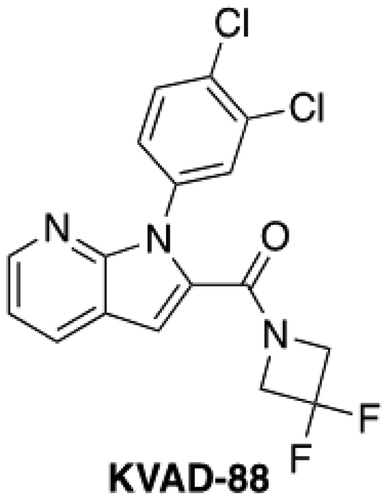当前位置:
X-MOL 学术
›
ACS Chem. Neurosci.
›
论文详情
Our official English website, www.x-mol.net, welcomes your feedback! (Note: you will need to create a separate account there.)
KVA-D-88, a Novel Preferable Phosphodiesterase 4B Inhibitor, Decreases Cocaine-Mediated Reward Properties in Vivo.
ACS Chemical Neuroscience ( IF 5 ) Pub Date : 2020-07-01 , DOI: 10.1021/acschemneuro.0c00170 Maria E Burkovetskaya 1 , Qiaoling Liu 1 , Anish K Vadukoot 2 , Nagsen Gautam 2 , Yazen Alnouti 2 , Sushil Kumar 2 , Klaus Miczek 3 , Shilpa Buch 1 , Corey R Hopkins 2 , Minglei Guo 1, 4
ACS Chemical Neuroscience ( IF 5 ) Pub Date : 2020-07-01 , DOI: 10.1021/acschemneuro.0c00170 Maria E Burkovetskaya 1 , Qiaoling Liu 1 , Anish K Vadukoot 2 , Nagsen Gautam 2 , Yazen Alnouti 2 , Sushil Kumar 2 , Klaus Miczek 3 , Shilpa Buch 1 , Corey R Hopkins 2 , Minglei Guo 1, 4
Affiliation

|
Cocaine addiction remains a major public concern throughout the world especially in developed countries. In the last three decades, significant achievements have led to a greater understanding of the signaling pathways involved in the development of cocaine addiction; however, there are no FDA-approved treatments available to reverse or block this brain disease due to either the unsatisfactory therapeutic efficacy or severe side effects. Previous studies have demonstrated that chronic exposure to cocaine elevates levels of cyclic AMP (cAMP) as a neuroadaptative response in reward-related brain regions. Phosphodiesterase 4 (PDE4) inhibitors, which elevate cAMP levels, have been shown to block cocaine-mediated behavioral changes related to psychoactive and reinforcing properties. Unfortunately, previously studied PDE4 inhibitors induce severe side-effects, which limit their clinical usage. In this study, we identified a novel PDE4B inhibitor, KVA-D-88, with an improved selectivity profile compared to previous compounds (e.g., rolipram). Pharmacokinetic studies have shown that this compound is brain penetrant and preferably acts on PDE4B compared to PDE4D in vitro, alluding to less unwanted side effects with KVA-D-88 in vivo. Interestingly, pretreatment with KVA-D-88 significantly inhibited cocaine-induced hyperlocomotor activity. In cocaine self-administering mice with differential schedules, KVA-D-88 strikingly decreased the number of active nose-pokes and cocaine infusions and reduced the break point. Taken together, our findings demonstrate that this novel PDE4 inhibitor, KVA-D-88, could inhibit cocaine-mediated rewarding effects implying its potential clinical usage for cocaine addiction.
中文翻译:

KVA-D-88 是一种新型的优选磷酸二酯酶 4B 抑制剂,可减少体内可卡因介导的奖励特性。
可卡因成瘾仍然是全世界特别是发达国家的主要公众关注点。在过去的 30 年中,取得的重大成就使人们对参与可卡因成瘾发展的信号通路有了更深入的了解;然而,由于治疗效果不理想或副作用严重,尚无 FDA 批准的治疗方法可用于逆转或阻断这种脑部疾病。先前的研究表明,长期接触可卡因会提高环 AMP (cAMP) 的水平,这是与奖赏相关的大脑区域的神经适应反应。提高 cAMP 水平的磷酸二酯酶 4 (PDE4) 抑制剂已被证明可以阻止可卡因介导的与精神活性和增强特性相关的行为变化。很遗憾,之前研究过的 PDE4 抑制剂会引起严重的副作用,这限制了它们的临床使用。在这项研究中,我们鉴定了一种新型 PDE4B 抑制剂 KVA-D-88,与之前的化合物(例如咯利普兰)相比,它具有更高的选择性。药代动力学研究表明,该化合物具有脑渗透性,与 PDE4D 相比,更适合作用于 PDE4B体外试验,暗示 KVA-D-88体内副作用较少。有趣的是,用 KVA-D-88 预处理可显着抑制可卡因诱导的运动过度活动。在不同时间表的可卡因自我给药小鼠中,KVA-D-88 显着减少了主动戳鼻子和可卡因输注的次数,并降低了折点。综上所述,我们的研究结果表明,这种新型 PDE4 抑制剂 KVA-D-88 可以抑制可卡因介导的奖励效应,这意味着其在可卡因成瘾方面的潜在临床用途。
更新日期:2020-08-05
中文翻译:

KVA-D-88 是一种新型的优选磷酸二酯酶 4B 抑制剂,可减少体内可卡因介导的奖励特性。
可卡因成瘾仍然是全世界特别是发达国家的主要公众关注点。在过去的 30 年中,取得的重大成就使人们对参与可卡因成瘾发展的信号通路有了更深入的了解;然而,由于治疗效果不理想或副作用严重,尚无 FDA 批准的治疗方法可用于逆转或阻断这种脑部疾病。先前的研究表明,长期接触可卡因会提高环 AMP (cAMP) 的水平,这是与奖赏相关的大脑区域的神经适应反应。提高 cAMP 水平的磷酸二酯酶 4 (PDE4) 抑制剂已被证明可以阻止可卡因介导的与精神活性和增强特性相关的行为变化。很遗憾,之前研究过的 PDE4 抑制剂会引起严重的副作用,这限制了它们的临床使用。在这项研究中,我们鉴定了一种新型 PDE4B 抑制剂 KVA-D-88,与之前的化合物(例如咯利普兰)相比,它具有更高的选择性。药代动力学研究表明,该化合物具有脑渗透性,与 PDE4D 相比,更适合作用于 PDE4B体外试验,暗示 KVA-D-88体内副作用较少。有趣的是,用 KVA-D-88 预处理可显着抑制可卡因诱导的运动过度活动。在不同时间表的可卡因自我给药小鼠中,KVA-D-88 显着减少了主动戳鼻子和可卡因输注的次数,并降低了折点。综上所述,我们的研究结果表明,这种新型 PDE4 抑制剂 KVA-D-88 可以抑制可卡因介导的奖励效应,这意味着其在可卡因成瘾方面的潜在临床用途。


























 京公网安备 11010802027423号
京公网安备 11010802027423号